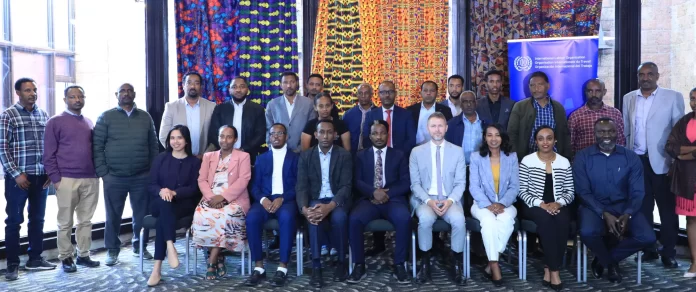Facebook Twitter (X) Instagram Somali Magazine - People's Magazine
In Kebribeyah, Ethiopia, where over 18,000 Somali refugees reside, a groundbreaking financial product is transforming lives and empowering entrepreneurs. The “Aisha” program, launched in February 2024 by Shabelle Bank in partnership with the International Labour Organization (ILO), provides Sharia-compliant financial solutions aimed at supporting both refugees and host communities in the Somali region of Ethiopia.
The program’s impact is exemplified by the success stories of two local women, Aisha Abdi, a 49-year-old Ethiopian mother of nine, and Kadra Yonis, a 57-year-old Somali refugee. Both women have leveraged the working capital provided by the Aisha loan to expand their businesses, significantly improving their livelihoods. Aisha expanded her small shop, stocking a wider range of consumable goods, while Kadra used her loan to expand her butter-selling business, increasing her customer base and profits. Their timely loan repayments and business growth demonstrate the effectiveness of the initiative in promoting financial responsibility and economic self-reliance.
A key feature of the Aisha program is its Sharia-compliant approach, which addresses the longstanding challenge of limited access to credit in Ethiopia’s Somali region. Religious beliefs prohibiting interest-based loans have historically restricted financial services. To overcome this, Shabelle Bank offers an alternative where the bank purchases and supplies essential products or equipment directly to entrepreneurs at a marked-up price. Entrepreneurs like Kadra, who received butter worth 50,000 Birr, repay the bank in manageable installments. Kadra sold her stock within a week, earning a profit of 6,250 Birr, which she reinvested to further expand her business.
In addition to providing capital, the Aisha program emphasizes financial literacy and business education. Before launching the product, Shabelle Bank trained 21 loan officers and frontline staff to effectively support the new market segment. Beneficiaries, including Aisha and Kadra, received comprehensive training in financial management and business development. These training sessions, developed using ILO modules such as “Start and Improve Your Business” and “Get Ahead,” equipped participants with essential skills, including inventory management, record-keeping, and loan repayment planning.
The program also introduced a peer support model to promote accountability and financial growth. Entrepreneurs were grouped together to encourage regular savings and timely loan repayments. This collective effort not only strengthened their financial discipline but also improved their credit ratings, granting them access to additional capital for future business expansion.
Shabelle Bank’s Microfinance Operations Director, Ahmed Abas, highlighted the transformative impact of the partnership with ILO, stating that the collaboration has made it possible to extend financial services to marginalized populations while adhering to cultural values. The support from ILO has been pivotal in developing the Aisha product, which has already begun transforming lives by providing access to capital and the knowledge needed for sustainable business growth.
Aisha’s success story underscores the profound impact of financial inclusion when paired with proper education and culturally sensitive solutions. By offering a pathway to financial stability and empowering women entrepreneurs, the program is fostering economic resilience in both refugee and host communities.
Stephen Opio, Chief Technical Advisor for ILO PROSPECTS in Ethiopia, emphasized the importance of financial inclusion as a tool for long-term economic stability in marginalized communities. He noted that initiatives like Aisha go beyond just providing capital—they equip entrepreneurs with the skills and tools necessary for sustained growth and prosperity.
The collaboration between Shabelle Bank and the ILO through the Aisha program serves as a model for sustainable development efforts in regions facing financial exclusion. By merging financial services with education and cultural sensitivity, the program not only empowers individuals but also strengthens the broader economic landscape of Ethiopia’s Somali region.

